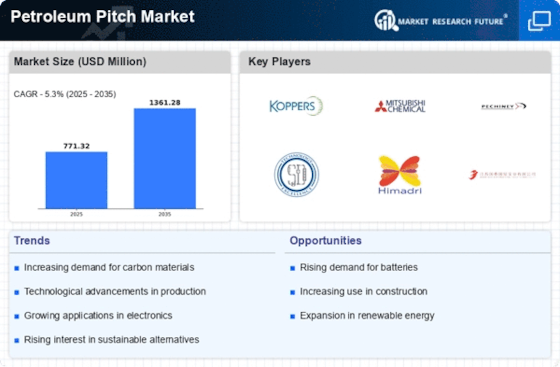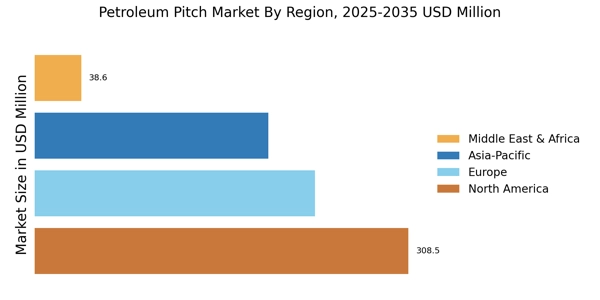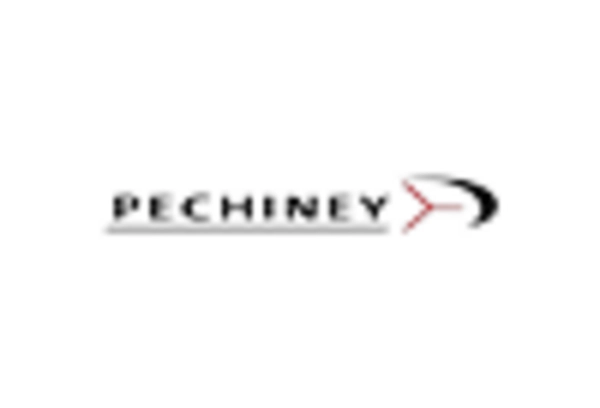Rising Demand for Carbon Black
The increasing demand for carbon black, a key application of petroleum pitch, is a notable driver in the Petroleum Pitch Market. Carbon black is extensively utilized in the production of tires and other rubber products, which are witnessing a surge in demand due to the growth of the automotive sector. In 2025, The Petroleum Pitch Market is projected to reach approximately 18 billion USD, indicating a robust growth trajectory. This rising demand for carbon black directly influences the petroleum pitch market, as manufacturers seek to secure high-quality pitch to meet production needs. Furthermore, the shift towards electric vehicles may also create new opportunities for petroleum pitch, as the materials used in battery production may require pitch-derived components. Thus, the interplay between carbon black demand and petroleum pitch production is likely to shape market dynamics.
Expansion of the Aerospace Sector
The expansion of the aerospace sector is significantly impacting the Petroleum Pitch Market. Petroleum pitch is increasingly being utilized in the production of advanced composite materials, which are essential for manufacturing lightweight and high-strength components in aircraft. As the aerospace industry continues to grow, driven by rising air travel and the need for fuel-efficient aircraft, the demand for petroleum pitch is expected to increase. In 2025, the aerospace composites market is anticipated to reach around 30 billion USD, suggesting a substantial opportunity for petroleum pitch suppliers. Additionally, the focus on reducing carbon emissions in aviation may lead to the development of new materials that incorporate petroleum pitch, further enhancing its relevance in this sector. Therefore, the growth of the aerospace industry presents a promising avenue for the petroleum pitch market.
Technological Innovations in Production
Technological innovations in the production of petroleum pitch are emerging as a crucial driver in the Petroleum Pitch Market. Advances in refining processes and the development of more efficient extraction techniques are enabling manufacturers to produce higher quality pitch at lower costs. For instance, the implementation of solvent extraction and thermal treatment methods has shown potential in enhancing the yield and purity of petroleum pitch. As a result, these innovations not only improve the economic viability of petroleum pitch production but also expand its applications across various industries, including electronics and construction. The market for petroleum pitch is projected to grow at a compound annual growth rate of approximately 4% from 2025 to 2030, indicating that technological advancements will play a pivotal role in sustaining this growth. Thus, the ongoing evolution of production technologies is likely to shape the future landscape of the petroleum pitch market.
Increasing Use in Energy Storage Solutions
The increasing use of petroleum pitch in energy storage solutions is becoming a significant driver in the Petroleum Pitch Market. With the rising demand for renewable energy sources, there is a growing need for efficient energy storage systems, particularly in the context of battery technology. Petroleum pitch is being explored as a potential material for anodes in lithium-ion batteries, which are crucial for electric vehicles and renewable energy applications. The Petroleum Pitch Market is projected to reach approximately 120 billion USD by 2025, indicating a substantial opportunity for petroleum pitch to penetrate this sector. Furthermore, the development of new battery technologies that utilize pitch-derived materials may enhance the performance and sustainability of energy storage solutions. Consequently, the integration of petroleum pitch into energy storage applications is likely to drive market growth in the coming years.
Regulatory Support for Sustainable Materials
Regulatory support for sustainable materials is increasingly influencing the Petroleum Pitch Market. Governments worldwide are implementing policies aimed at promoting the use of sustainable and eco-friendly materials across various sectors. This regulatory environment encourages manufacturers to explore petroleum pitch as a viable alternative to traditional materials, particularly in applications such as construction and automotive. For instance, initiatives aimed at reducing carbon footprints and enhancing energy efficiency are likely to drive demand for petroleum pitch, as it can be produced with lower environmental impact compared to other materials. The market for sustainable materials is expected to grow significantly, with projections indicating a potential increase of over 10% annually through 2030. As such, the alignment of petroleum pitch production with sustainability goals may present new opportunities for market participants, fostering innovation and growth.

















